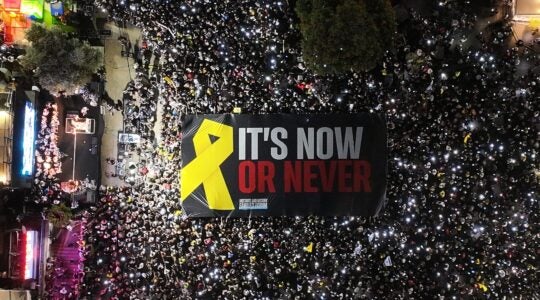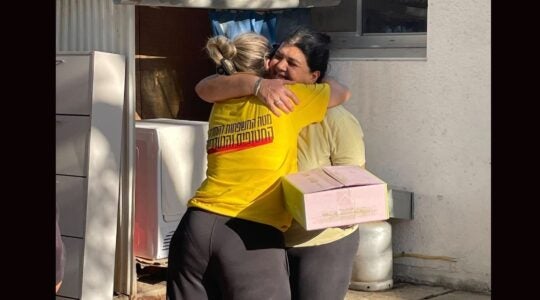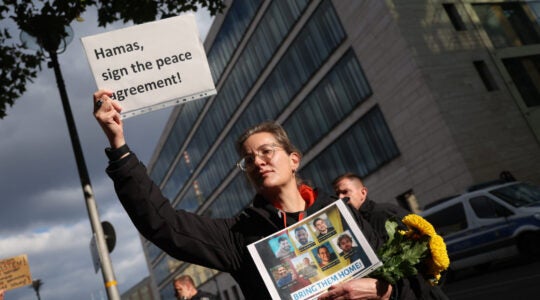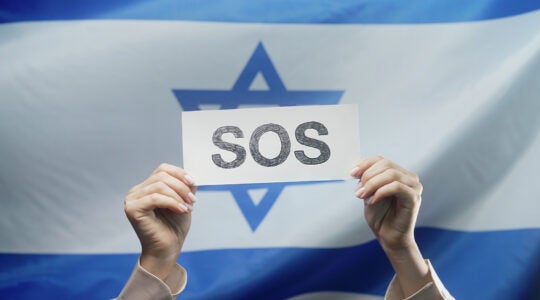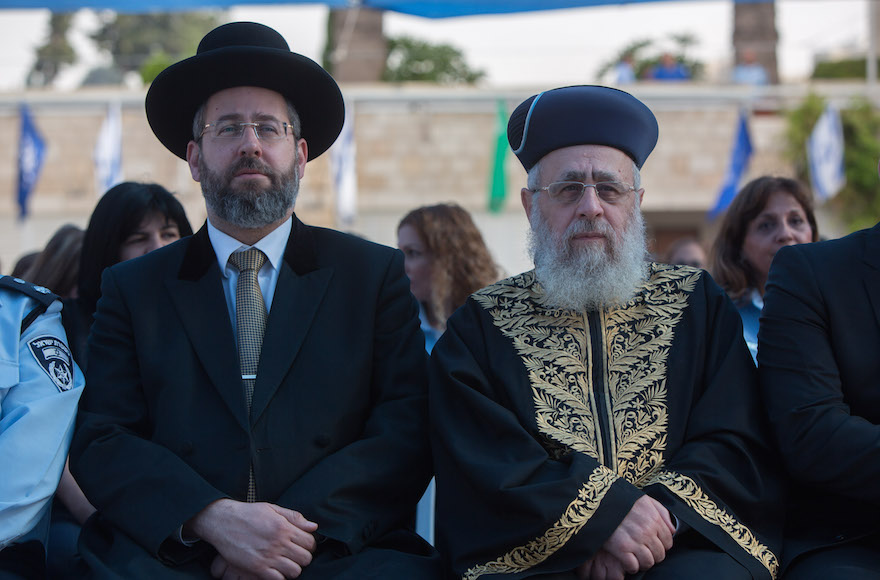
Sephardi Chief Rabbi Yitzhak Yosef, right, and Ashkenazi Chief Rabbi David Lau attending a New Year’s ceremony at the national headquarters of the Israel Police in Jerusalem, Sept. 7, 2015. (Yonatan Sindel/Flash90)
JERUSALEM (JTA) — Israel’s Chief Rabbinate committed to creating standards for recognizing which Diaspora rabbis it trusts to handle Jewish conversions.
The Ashkenazi and Sephardi chief rabbis announced separately Wednesday afternoon that they would convene a meeting next week with the Chief Rabbinate Council and the Supreme Rabbinical Court aimed at determining the standards. The standards would be used to create a list of Diaspora rabbis recognized by the Rabbinate, Chief Sephardi Rabbi Yitzhak Yosef said in his statement.
He also promised the Jewish conversion of Ivanka Trump, the daughter of U.S. President-elect Donald Trump, would be recognized under the new standards.
“This reform is expected to stop the suffering of many converts who have been through a conversion abroad when they come to register for marriage and divorce in Israel. In contrast to the situation in the past, in which some officials in the Chief Rabbinate assumed the authority to check every case individually, now as mentioned above, every conversion that will be approved by a rabbi who is on the list of the approved rabbis will not be subject to further checking but will be approved automatically,” Yosef said.
“For example, what reached the headlines recently was the issue of the recognition of the conversion of Ivanka Trump, the daughter of the president-elect of the United States. According to the new proposed outline in which you check the converting rabbi only, their conversion would be legitimized without the need for further checking,” Yosef said.
The Chief Rabbinate is Israel’s highest Jewish authority, with control over personal status issues, like conversion, marriage and divorce. The Chief Rabbinate Council is its advisory body. The Supreme Rabbinical Court is the highest rabbinical court, which resolves disputes regarding personal status issues.
The Rabbinate released a list in April of more than 100 rabbis from the U.S. and 19 other countries whose authority over Jewish conversions it accepts. But the Rabbinate attached a letter to the list saying it was “not exhaustive” and simply included rabbis whose authority had been accepted in the past. The letter also said there was no guarantee the rabbis would be trusted in the future.
The Chief Rabbinate did not respond to JTA’s request for comment.
Controversially, the Rabbinate’s April list did not include prominent modern Orthodox rabbis like New York Rabbi Avi Weiss, who founded the progressive Open Orthodoxy movement.
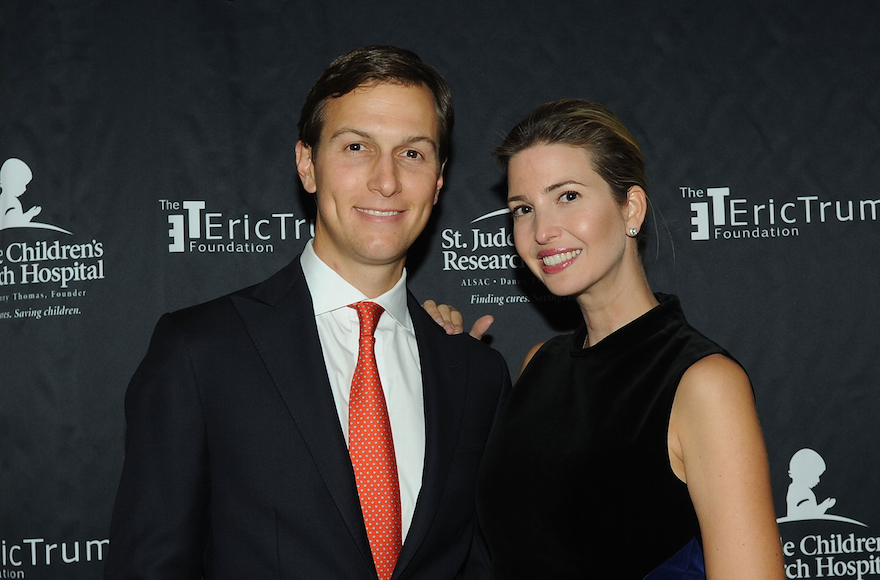
Jared Kushner and his wife Ivanka Trump at the Trump National Golf Club in Westchester, New York, Sept. 21, 2015. (Bobby Bank/WireImage/Getty Images)
The haredi-dominated Rabbinate has never recognized non-Orthodox rabbis or conversions, and in the past few years it has questioned the credentials of a few leading liberal Orthodox rabbis. In September, Haaretz revealed the Rabbinate had rejected four conversions approved by Rabbi Gedalia Dov Schwartz, the head of the Rabbinical Council of America’s rabbinical court. In July, the Rabbinate rejected a conversion by Rabbi Haskel Lookstein, the former leader at Kehilath Jeshurun in Manhattan’s Upper East Side under whose auspices Ivanka Trump converted before her marriage to Jared Kushner.
ITIM, an organization that helps Israelis navigate the state’s religious bureaucracy, petitioned a Jerusalem court in 2015 to pressure the Rabbinate to be more transparent about how it determines which Jewish conversions are legitimate. That petition led to the release of the Rabbinate’s first list of rabbis. It also drew attention to Itamar Tubul, a midlevel bureaucrat who evaluates requests from Israeli immigrants seeking a marriage license and ensures they are Jewish.
Rabbi Seth Farber, the director of ITIM, responded to Wednesday’s announcement with cautious optimism.
“We are incredibly gratified that the rabbinate has recognized its lack of policies regarding converts from overseas in harmful to Judaism in Israel and around the world. I hope that the outcome of this assembly will remove the insane bureaucracy that converts are forced to undergo to certify their Jewishness,” he said in a statement. “We will need to see the results of these meetings and ensure the criteria do not exclude wide swaths of the Jewish people.”
But Rabbi Uri Regev, the head of Hiddush, an organization that promotes religious pluralism in Israel, was skeptical the Rabbinate was capable of significantly liberalizing.
“With the makeup of the group that is convening next week, in my view it is very unlikely that they will come up with an agreed upon set of criteria that will be inclusive of the mainstream modern Orthodox rabbinate of North America today,” he told JTA. “They may approve of Rabbi Lookstein, not because of Rabbi Lookstein but because of Donald Trump. But there is no way in the world they will accept and legitimize the rank and file rabbis without further inquiry into individual converts.
JTA has documented Jewish history in real-time for over a century. Keep our journalism strong by joining us in supporting independent, award-winning reporting.

